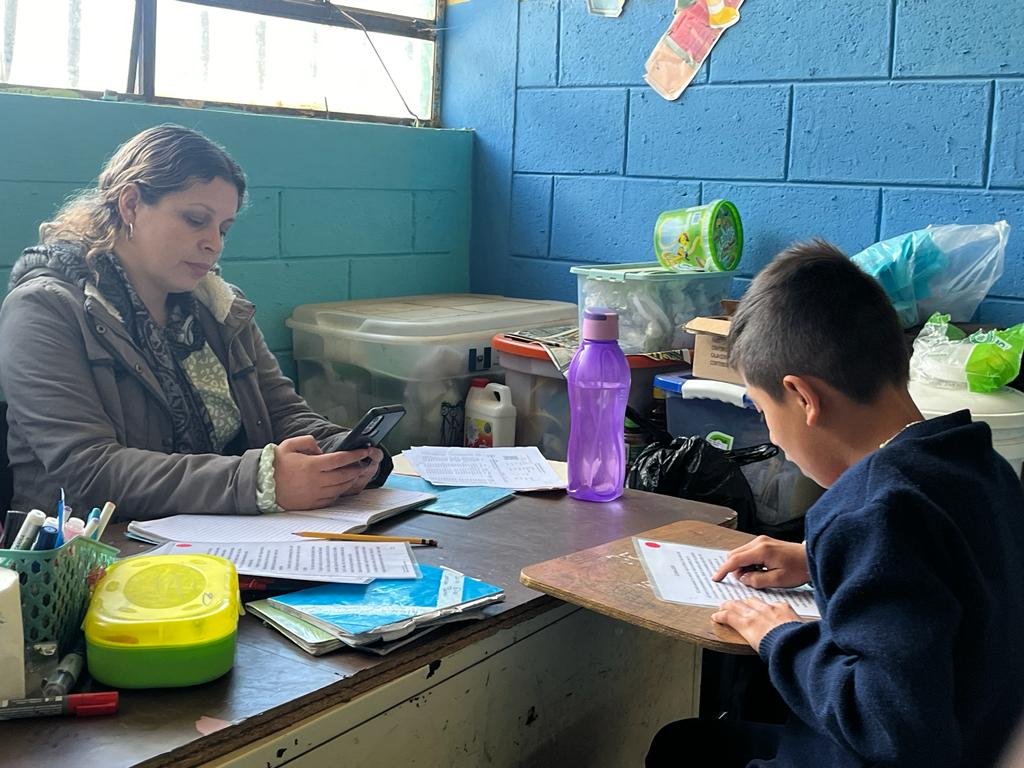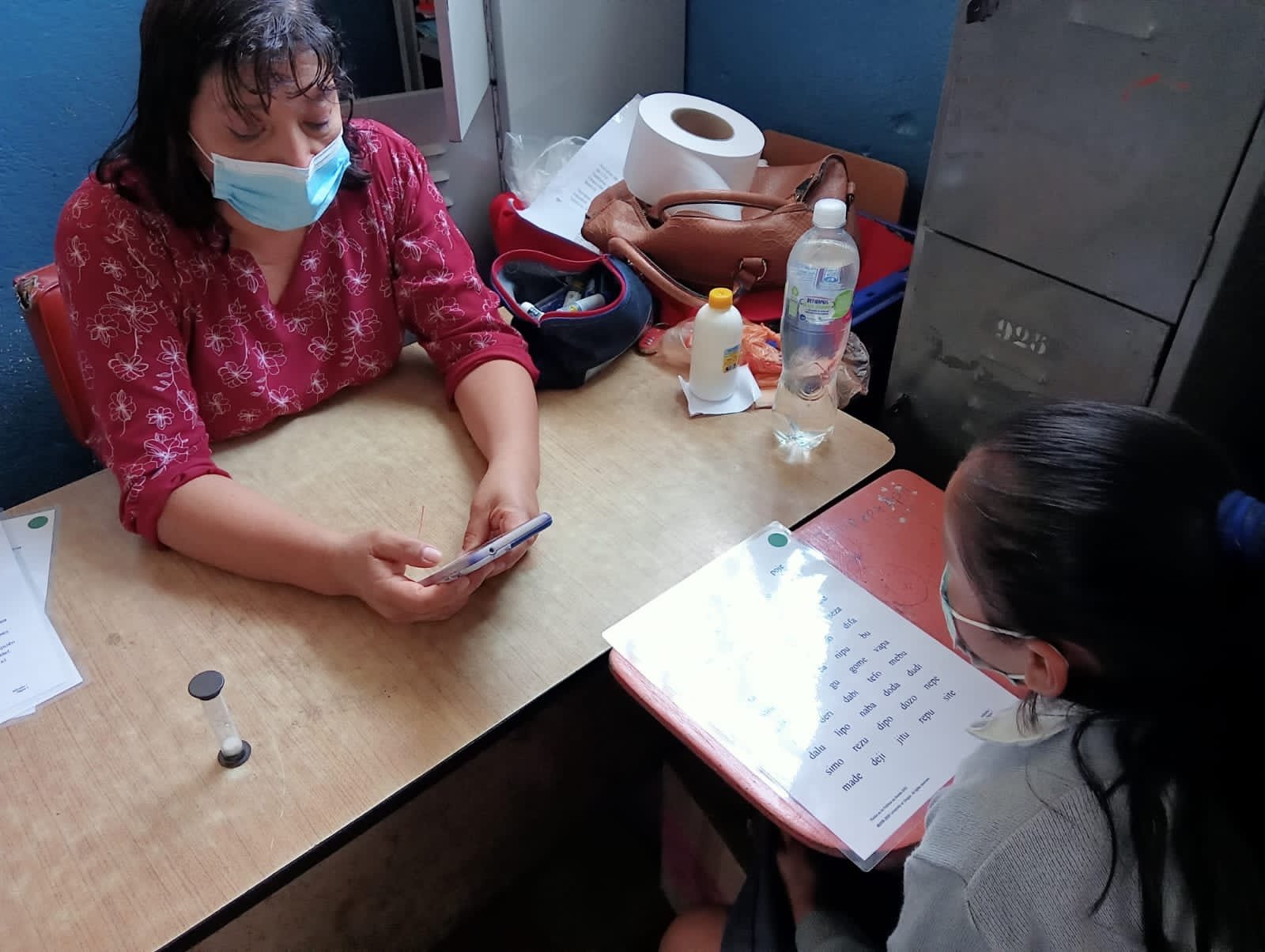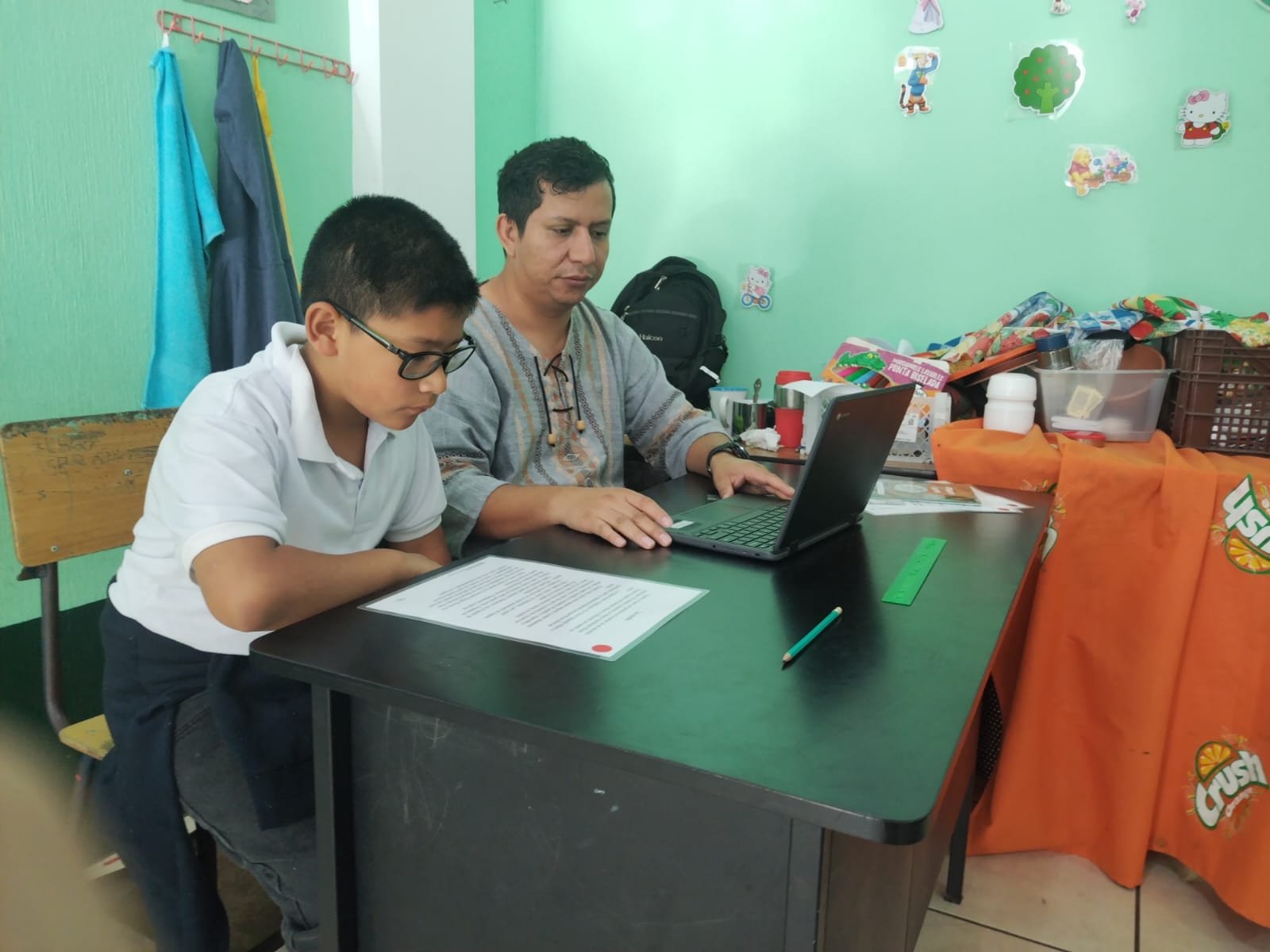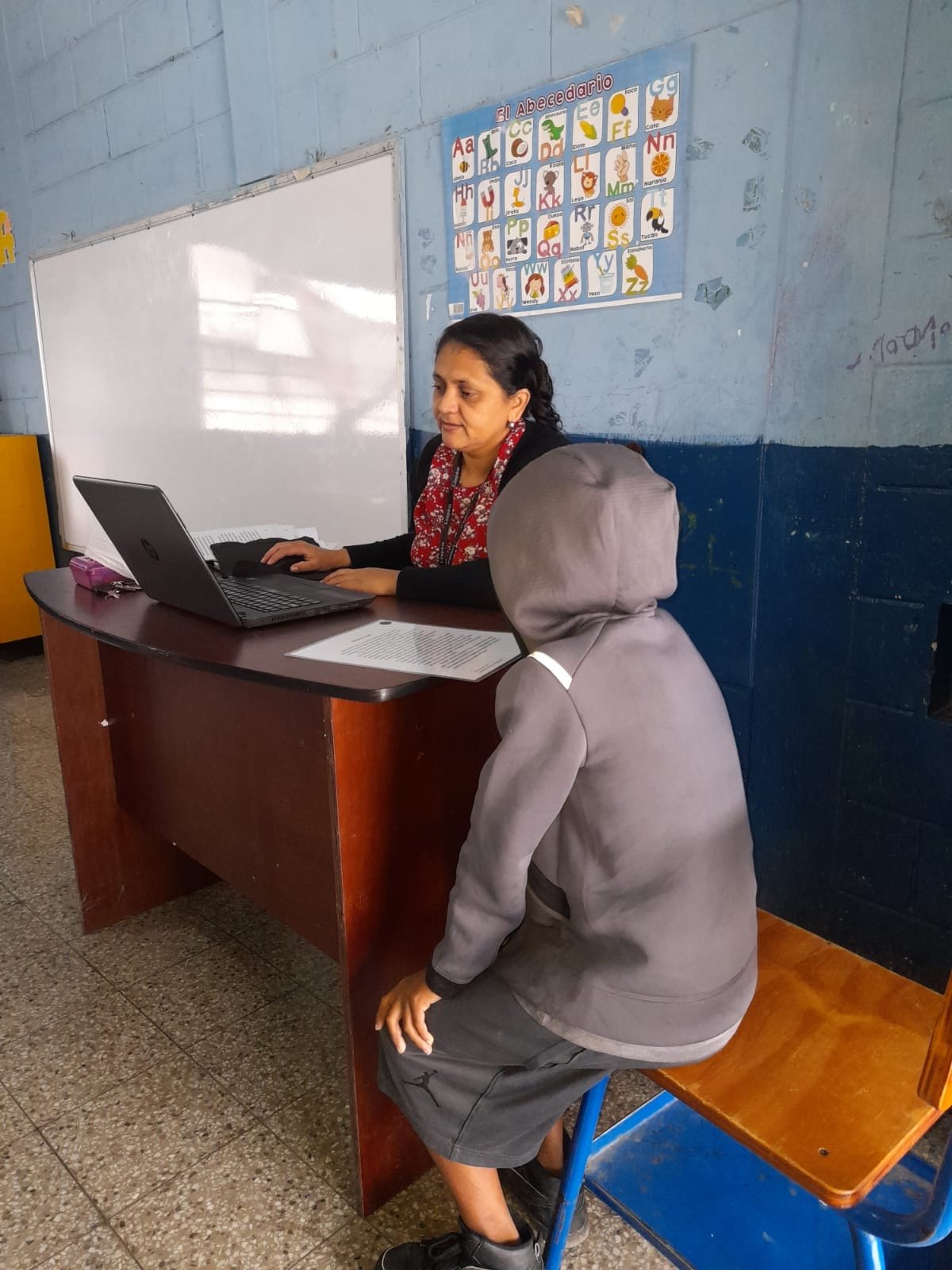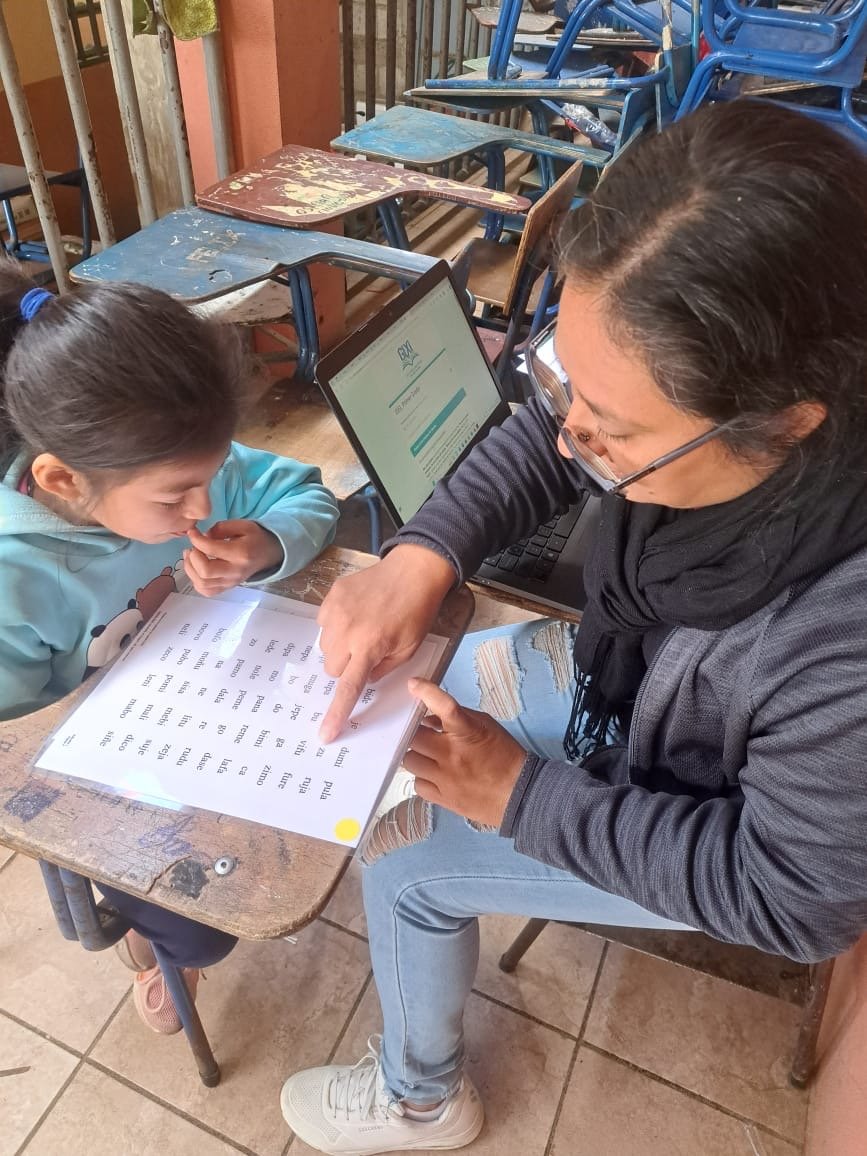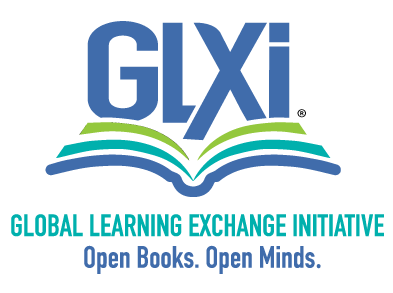Student Assessments Show Success in GLXi Classrooms
GLXi teacher Ana María del Rosario Castillo Carías administers the IDEL test to a second grader at the Official Urban Mixed School "Colonia 1 de Mayo" in Guatemala
“Past experience gave us confidence in our curriculum and teachers, but we also were aware of new learning losses and deficiencies that occurred as a result of the COVID-19 pandemic. We knew these were compounding challenges to improving literacy education in Guatemala. In response, we pivoted our approaches and intervened when identifying learning trouble spots occurring during the year. The results of the 2023 school year assessments confirmed that we are on the right track in our approach. Student assessments will continue to serve as important input as we move forward. Much credit goes to our teachers in the field and GLXI’s education team, who diligently worked with the teachers throughout the year. ”
In Guatemala, where learning resources and supplies are scarce, the presence of Global Learning Exchange Initiative (GLXi) in a school makes a palpable difference.
When you step inside a classroom that is using GLXi’s Open Books, Open Minds curriculum, you feel a special kind of energy. The kids are excited and engaged. The teacher is motivated. You sense that great things are happening.
But it’s more than just a feeling. We have numbers to back it up.
GLXi teacher Roseline García Carías administers the IDEL test to a first grade student at the Official Rural Mixed School in Guatemala.
Every year, we administer the IDEL test (“Indicadores Dinámicos del Éxito en la Lectura") to get a quantitative measure of how GLXi® students are doing with their reading and learning. This research-based formative assessment includes a series of measures designed to assess the basic early literacy skills of children learning to read in Spanish.
It is a reliable and effective way to measure student progress. But this testing process was interrupted during the COVID-19 pandemic (as so many educational efforts were).
This past year, for the first time since the pandemic, students returned to classrooms full time and we were able to administer these assessments at both the beginning and end of the year.
This gave us a comprehensive read of student progress – and also an understanding of how GLXi’s curriculum is helping classrooms recover from the multi-faceted blows of the pandemic.
The results are even better than we could have predicted!
Across all fronts, the assessments showed us that GLXi’s Open Books, Open Minds curriculum is making a measurable difference in the classroom.
“Based on what we’ve been seeing in the classrooms, we anticipated good results. But the teachers and students participating in our program once again exceeded our expectations. The teachers took the challenges of the pandemic and turned them into opportunities for growth, and the students eagerly embraced all that was imparted to them. On all measures, the students demonstrated a successful mastery of the concepts. We couldn’t be more proud of them for their efforts!” — Jaime Vielman, GLXi’s Executive Director in Guatemala.
Here are just a few highlights :
The percentage of GLXi students performing at their expected grade level exceeded our goal for the year.
GLXi students significantly outperformed control groups of students who were not following the Open Books, Open Minds curriculum.
GLXi students showed noteworthy gains in their reading levels over the course of the year, proving that we are making a difference in responding to the after-effects of the pandemic.
These amazing results show the effectiveness of the GLXi education team in addressing learning issues identified by the teachers, the quality of our training, and the dedication of the teachers to help their students.
Interested in seeing the numbers? Great! Because we have been SO excited to share them.
IDEL Results (More than Ideal!)
Final Assessments
Our goal and expectation was to see 60 percent of GLXi students reading at their grade level by the end of the 2023 school year. Remember: in Guatemala, it is more likely to see 60 percent of students NOT reading at grade level. We expected our students would perform better than that average.
The students’ results exceeded our expectations. Approximately 70 percent of our first-graders, 73 percent of our second-graders, and 79 percent of our third-graders demonstrated reading proficiency at grade level – or about 74 percent on average! We are ecstatic over these numbers.
It will be a particularly exciting year, as the pre-primary teachers who are currently in training graduate and start to execute our vision and methodology in the classroom.
School Year Progress
It was important to us to see how students progressed over the course of the 2023 school year. This was to give us a real-time sense of our program’s impact. And it was of particular interest because we weren’t able to perform beginning-to-end evaluations the last few years, when the pandemic introduced so many other variables like remote and hybrid learning.
The results, once again, knocked our socks off.
Throughout the school year, GLXi students increased their reading levels by 35 percent on average. This is fantastic progress over the course of a school year and speaks to the impact of our program.
Comparison to Non-GLXi Students
With the return of “school as normal,” we’d expect to see most students showing some progress in their reading over the course of the year, regardless of whether the student participated in GLXi’s program or not.
For that reason, it was also important to measure whether GLXi students improved at a significantly higher rate than their peers who did not have the Open Books, Open Minds tools and resources.
In other words, not only did they improve, but did they improve more than those outside the program.
Once again, proof of our program’s success is in the numbers.
GLXi students tested higher than the “control group” of students (those not enrolled in our program) at both the beginning and end of the year, and also in their improvement over the course of the year!
Non-GLXi students showed an approximately 11 percent improvement over the course of the school year, compared to the 35 percent improvement that GLXi students showed on the IDEL assessment standards (7th edition).
These are phenomenal results that demonstrate that our program is meeting its goals.
Learning from IDEL
We should note, the purpose of these assessments is not just to demonstrate success or give us something to tout on social media (although these students are definitely worth bragging about!) . We study them carefully to see where we might need to adjust our programming and training to best meet the needs of teachers and students.
For example, we learned that for GLXi students, reading fluency is their strongest skill. Their least developed skill is IDEL word fluency (vocabulary). This gives us something to work on.
It is important that we always have our finger on the pulse of our participating classrooms. That is how we pivot and respond, and how we continue to best serve our program participants. These teachers and students deserve our best efforts and more!
You can help support our programming. Donate to GLXi here.
